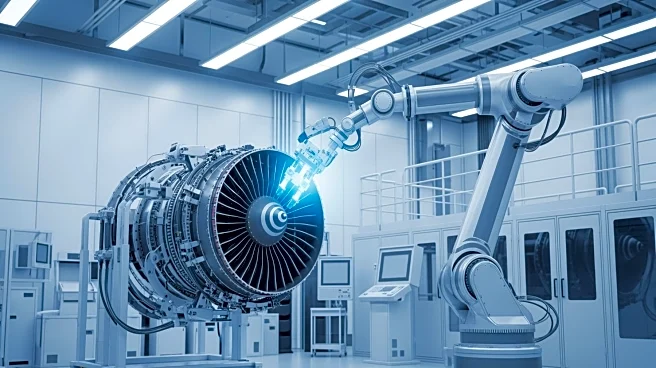What's Happening?
The aviation industry is increasingly integrating artificial intelligence (AI) into aircraft maintenance operations, as highlighted in the November issue of Inside MRO. Aviation Week editors Lee Ann Shay,
Lindsay Bjerregaard, and James Pozzi discuss the growing adoption of AI technologies by airlines, original equipment manufacturers (OEMs), and maintenance, repair, and overhaul (MRO) companies. AI applications are being utilized for text and image recognition, predictive maintenance, and optimizing inventory management. Companies like Air France-KLM are developing in-house AI solutions, while others partner with external providers such as Google and Microsoft to enhance their capabilities. The industry is also leveraging AI to pool tribal knowledge and improve workforce efficiency.
Why It's Important?
The adoption of AI in aircraft maintenance is significant as it promises to enhance operational efficiency and reduce costs. By automating repetitive tasks and improving data processing, AI can streamline maintenance schedules and optimize resource allocation. This technological shift is crucial for the aviation industry, which faces challenges such as workforce shortages and increasing demand for air travel. Companies that successfully integrate AI into their operations stand to gain a competitive edge by improving service reliability and reducing downtime. The broader impact includes potential advancements in safety and sustainability, as AI-driven insights can lead to more proactive maintenance strategies.
What's Next?
As AI continues to gain traction in the aviation sector, companies are expected to expand their AI teams and develop more sophisticated applications. The focus will likely be on enhancing data quality and system integration to maximize the benefits of AI technologies. Stakeholders may also explore partnerships with tech giants to leverage their expertise in AI development. The industry could see increased investment in AI-driven tools and platforms, fostering innovation and collaboration across the sector. Additionally, ongoing discussions about the ethical use of AI and its limitations will shape future developments, ensuring that AI applications are both effective and responsible.
Beyond the Headlines
The integration of AI in aircraft maintenance raises important ethical and operational considerations. As AI systems become more prevalent, questions about data privacy, accuracy, and accountability will need to be addressed. The industry must ensure that AI tools are used responsibly and that human oversight remains a critical component of maintenance operations. Furthermore, the shift towards AI-driven processes may require a cultural change within organizations, emphasizing continuous learning and adaptation. Long-term, the successful implementation of AI could lead to a more resilient and agile aviation industry, capable of responding to evolving challenges and opportunities.










